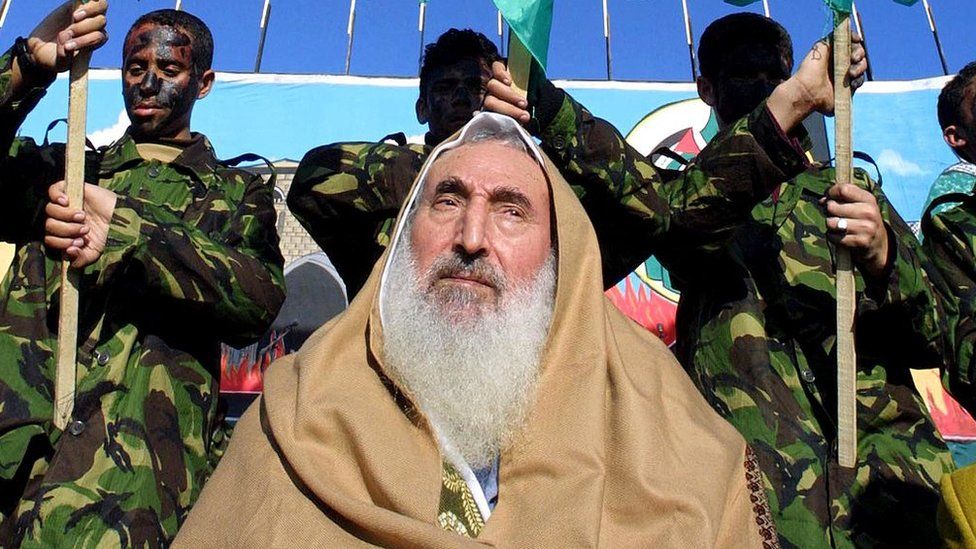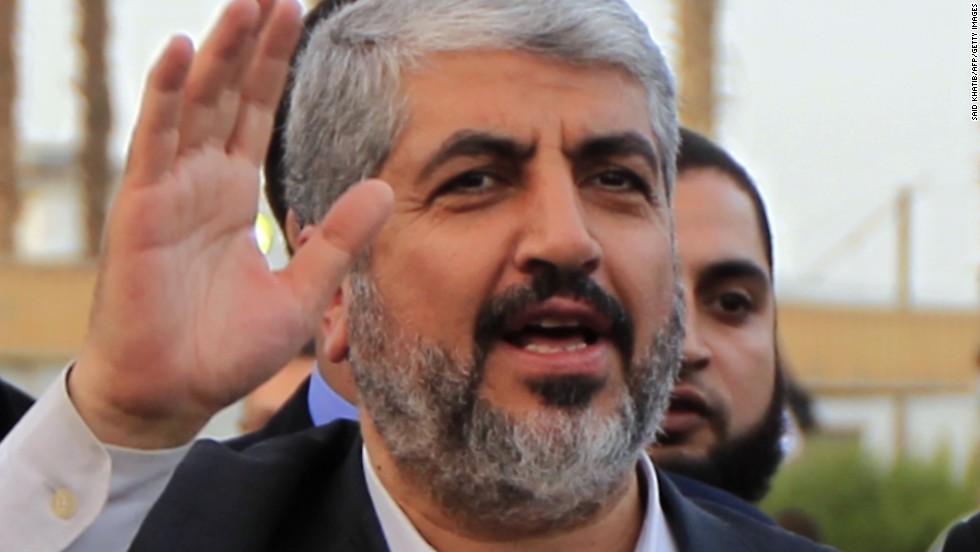Leadership and History: Israel Hamas Leader

Hamas, a Palestinian Islamist political and militant organization, has a complex history intertwined with the Israeli-Palestinian conflict. Its leadership has evolved over time, reflecting the changing dynamics of the conflict and internal power struggles.
Founding and Early Leadership
Hamas was founded in 1987, emerging from the Palestinian Muslim Brotherhood. Sheikh Ahmed Yassin, a prominent Islamic scholar and founder of the Islamic University of Gaza, became the first leader of Hamas. Yassin’s leadership was characterized by his strong religious convictions and commitment to armed resistance against Israel. He was assassinated by Israel in 2004.
The Rise of Ismail Haniyeh, Israel hamas leader
Following Yassin’s death, Ismail Haniyeh, a former Hamas leader in Gaza, took over as the organization’s political head. Haniyeh, known for his pragmatic approach and political acumen, played a crucial role in Hamas’s electoral victory in the 2006 Palestinian legislative elections. He has been instrumental in navigating the organization through challenging periods, including the 2007 Hamas takeover of Gaza and subsequent Israeli blockade.
Yahya Sinwar and the Current Leadership
In 2017, Yahya Sinwar, a former Hamas military commander, was elected as the new leader of Hamas in Gaza. Sinwar, known for his hard-line stance against Israel, has overseen a period of increased military activity and escalation of the conflict. He is seen as a more militant figure compared to Haniyeh, emphasizing armed struggle and challenging Israel’s security policies.
Evolution of Hamas Ideology
Hamas’s ideology has evolved over time, adapting to changing circumstances and internal debates. While its founding principles remain rooted in Islamic fundamentalism and resistance against Israel, there have been internal discussions and disagreements regarding the best strategy for achieving its goals. Some factions within Hamas have advocated for a more pragmatic approach, engaging in political negotiations and seeking a two-state solution, while others have maintained a focus on armed resistance.
Impact of External Factors
Hamas leadership has been significantly influenced by external factors, particularly Israeli policies and international pressure. Israel’s military operations and ongoing occupation of Palestinian territories have fueled Hamas’s resistance and fueled support for its armed struggle. International pressure and sanctions have also played a role in shaping Hamas’s actions and strategies. The organization has faced criticism for its use of violence and its refusal to recognize Israel’s right to exist.
International Relations and Diplomacy

Hamas, as a Palestinian political and militant group, has been a central player in the Israeli-Palestinian conflict, and its international relations have been marked by both support and condemnation. This section will delve into the international actors who have engaged with Hamas leadership, the diplomatic efforts to resolve the conflict, and the impact of international sanctions on the group.
Key Players in International Relations
The international arena has witnessed a complex and evolving relationship between Hamas leadership and various countries. The following are some of the key players who have engaged with Hamas leadership:
- Qatar: Qatar has been a key supporter of Hamas, providing financial assistance and political backing. Qatar’s role has been significant in facilitating dialogues between Hamas and other Palestinian factions, as well as in mediating with Israel.
- Turkey: Turkey has also been a vocal supporter of Hamas, providing humanitarian aid and political support. Turkey’s relationship with Hamas has been marked by strong ties, with both countries sharing similar views on the Palestinian cause.
- Egypt: Egypt has a complex relationship with Hamas. While Egypt has maintained diplomatic ties with Israel, it has also been involved in mediating between Hamas and Israel. Egypt’s role has been crucial in facilitating ceasefires and mediating negotiations between the two sides.
- Iran: Iran has been a major supporter of Hamas, providing military and financial assistance. Iran’s support for Hamas has been a source of tension with Israel and the West, who view Iran as a state sponsor of terrorism.
- United States: The United States has designated Hamas as a terrorist organization and has imposed sanctions on the group. However, the US has also engaged in diplomatic efforts to address the Israeli-Palestinian conflict, and there have been occasional attempts to engage with Hamas leadership.
- European Union: The European Union has also designated Hamas as a terrorist organization and has imposed sanctions on the group. However, the EU has also been involved in efforts to promote peace and reconciliation in the Middle East, and has engaged with Hamas leadership on specific issues.
Diplomatic Efforts and Hamas Leadership
The Israeli-Palestinian conflict has been a long-standing issue, with numerous diplomatic efforts undertaken to resolve it. Hamas leadership has played a complex role in these efforts, sometimes engaging in negotiations and at other times refusing to participate.
- Oslo Accords: The Oslo Accords, signed in the 1990s, were a major attempt to reach a peace agreement between Israel and the Palestine Liberation Organization (PLO). Hamas leadership opposed the Oslo Accords, arguing that they were a betrayal of the Palestinian cause. This rejection has contributed to the ongoing conflict.
- Gaza Disengagement: In 2005, Israel unilaterally withdrew its troops and settlers from the Gaza Strip. Hamas leadership viewed this as a victory, but it also led to increased tensions with Israel. The withdrawal paved the way for Hamas to take control of Gaza in 2007.
- Cairo Negotiations: In 2011, Egypt facilitated negotiations between Hamas and Israel in Cairo. These negotiations aimed to reach a long-term ceasefire agreement, but they ultimately failed. Hamas’s unwillingness to recognize Israel and its insistence on the right of return for Palestinian refugees were key obstacles.
Impact of International Sanctions and Diplomatic Isolation
International sanctions and diplomatic isolation have had a significant impact on Hamas leadership. These measures have aimed to weaken Hamas’s financial resources, restrict its access to weapons, and limit its political influence.
- Financial Restrictions: International sanctions have targeted Hamas’s financial resources, freezing assets and limiting access to international banking systems. This has hampered Hamas’s ability to fund its operations and provide social services in Gaza.
- Arms Embargo: Hamas has been subject to an international arms embargo, which has restricted its access to weapons. This has made it difficult for Hamas to maintain its military capabilities and defend itself against Israeli attacks.
- Diplomatic Isolation: Hamas has been largely isolated from the international community, with most countries refusing to recognize it as a legitimate political entity. This isolation has limited Hamas’s ability to participate in international forums and to build alliances with other countries.
International Approaches to Hamas Leadership
The international community has adopted a range of approaches towards Hamas leadership, with different countries having distinct policies. The following table summarizes the approaches of key players:
| Country/Organization | Approach | Key Features |
|---|---|---|
| United States | Designated as a terrorist organization, imposed sanctions | Financial restrictions, arms embargo, travel bans |
| European Union | Designated as a terrorist organization, imposed sanctions | Financial restrictions, arms embargo, travel bans |
| Qatar | Supportive, provided financial and political assistance | Facilitated dialogues, mediated with Israel |
| Turkey | Supportive, provided humanitarian aid and political support | Shared views on the Palestinian cause, strong ties |
| Egypt | Complex relationship, mediating between Hamas and Israel | Facilitated ceasefires, mediated negotiations |
| Iran | Supportive, provided military and financial assistance | Viewed as a state sponsor of terrorism by Israel and the West |
Israel hamas leader – The conflict between Israel and Hamas is a complex and multifaceted issue, with both sides presenting their own narratives and justifications for their actions. Amidst the political turmoil and international tensions, it’s easy to forget the simple joys of life, like sinking into a cozy nintendo boo bean bag chair and escaping into a world of video games.
Ultimately, however, the search for peace and understanding remains paramount, as the leaders of Israel and Hamas grapple with the weight of their decisions and the consequences they carry for their people.
The ongoing conflict between Israel and Hamas leaders continues to cast a shadow over the region. Amidst the tension and uncertainty, it’s easy to forget the simple joys of life, like a peaceful picnic. Imagine a tranquil setting, with the sun gently filtering through the leaves, and a picnic double folding chair with umbrella table and cooler providing a comfortable haven.
Perhaps, in the midst of such peaceful moments, a glimmer of hope for reconciliation could emerge between Israel and Hamas leaders, paving the way for a more peaceful future.
